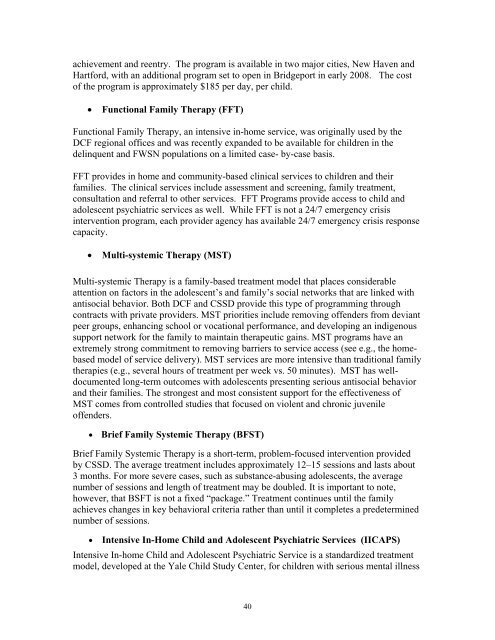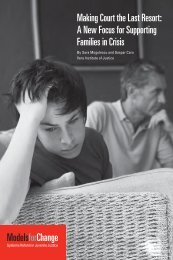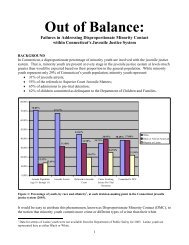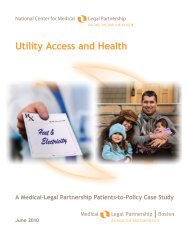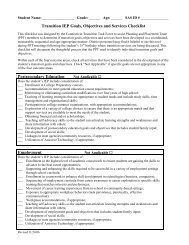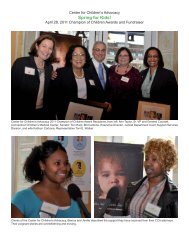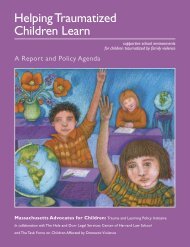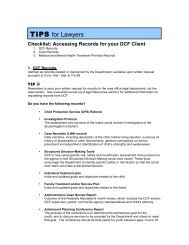FWSN-advisorybd-repo.. - The Connecticut Juvenile Justice Alliance
FWSN-advisorybd-repo.. - The Connecticut Juvenile Justice Alliance
FWSN-advisorybd-repo.. - The Connecticut Juvenile Justice Alliance
Create successful ePaper yourself
Turn your PDF publications into a flip-book with our unique Google optimized e-Paper software.
achievement and reentry. <strong>The</strong> program is available in two major cities, New Haven and<br />
Hartford, with an additional program set to open in Bridgeport in early 2008. <strong>The</strong> cost<br />
of the program is approximately $185 per day, per child.<br />
• Functional Family <strong>The</strong>rapy (FFT)<br />
Functional Family <strong>The</strong>rapy, an intensive in-home service, was originally used by the<br />
DCF regional offices and was recently expanded to be available for children in the<br />
delinquent and <strong>FWSN</strong> populations on a limited case- by-case basis.<br />
FFT provides in home and community-based clinical services to children and their<br />
families. <strong>The</strong> clinical services include assessment and screening, family treatment,<br />
consultation and referral to other services. FFT Programs provide access to child and<br />
adolescent psychiatric services as well. While FFT is not a 24/7 emergency crisis<br />
intervention program, each provider agency has available 24/7 emergency crisis response<br />
capacity.<br />
• Multi-systemic <strong>The</strong>rapy (MST)<br />
Multi-systemic <strong>The</strong>rapy is a family-based treatment model that places considerable<br />
attention on factors in the adolescent’s and family’s social networks that are linked with<br />
antisocial behavior. Both DCF and CSSD provide this type of programming through<br />
contracts with private providers. MST priorities include removing offenders from deviant<br />
peer groups, enhancing school or vocational performance, and developing an indigenous<br />
support network for the family to maintain therapeutic gains. MST programs have an<br />
extremely strong commitment to removing barriers to service access (see e.g., the homebased<br />
model of service delivery). MST services are more intensive than traditional family<br />
therapies (e.g., several hours of treatment per week vs. 50 minutes). MST has welldocumented<br />
long-term outcomes with adolescents presenting serious antisocial behavior<br />
and their families. <strong>The</strong> strongest and most consistent support for the effectiveness of<br />
MST comes from controlled studies that focused on violent and chronic juvenile<br />
offenders.<br />
• Brief Family Systemic <strong>The</strong>rapy (BFST)<br />
Brief Family Systemic <strong>The</strong>rapy is a short-term, problem-focused intervention provided<br />
by CSSD. <strong>The</strong> average treatment includes approximately 12–15 sessions and lasts about<br />
3 months. For more severe cases, such as substance-abusing adolescents, the average<br />
number of sessions and length of treatment may be doubled. It is important to note,<br />
however, that BSFT is not a fixed “package.” Treatment continues until the family<br />
achieves changes in key behavioral criteria rather than until it completes a predetermined<br />
number of sessions.<br />
• Intensive In-Home Child and Adolescent Psychiatric Services (IICAPS)<br />
Intensive In-home Child and Adolescent Psychiatric Service is a standardized treatment<br />
model, developed at the Yale Child Study Center, for children with serious mental illness<br />
40


